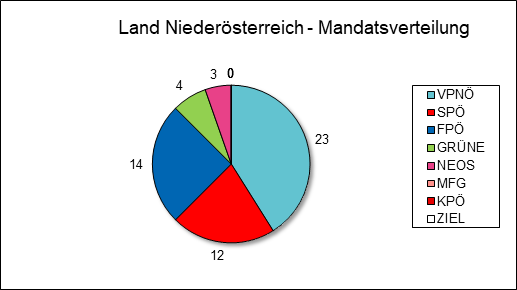A Coalition Of All The Losers
The ÖVP and SPÖ may form a coalition to govern Lower Austria even though they both achieved their worst election results statewide since 1945 on Sunday
Servus!
In Sunday’s state election in Lower Austria, the conservative People’s Party (ÖVP) saw their vote share fall by almost 10 points, thus achieving their worst result statewide since the end of the Second World War. The party won 39.93 percent of the vote, beating out the far-right Freedom Party (FPÖ), who saw their share to the vote climb almost 10 points to 24.19 percent. The Social Democratic Party’s decline in Lower Austria continued, finishing third on 20.65 percent, a little over 3 points down on their standing in 2018. On Monday, the SPÖ moved swiftly to dethrone its gubernatorial candidate Franz Schnabl, replacing with a fresh face, the 34-year-old Sven Hergovich.
The far-right in Lower Austria benefited, above all, from an exodus of voters from the conventional right to the extremes. Some 72,000 voters who voted for the ÖVP in 2018 plumped for the FPÖ this time around. The FPÖ also brought on board 29,000 former SPÖ voters and 23,000 voters who stayed home in 2018. The ÖVP also lost 36,000 2018 voters to a recent change in statewide election law that disenfranchised second home owners whose primary address is in another state. By comparison, the SPÖ lost only 7,000 voters and the FPÖ 2,000 owing to this amendment.
The result means the ÖVP has lost not only its precious absolute majority in the Lower Austrian state parliament—one it has held on to through thick and thin for 20 years—but also its majority in the executive, within which cabinet posts are divided among parties according to their parliamentary representation1. Henceforth, the ÖVP will be entitled to four cabinet posts, the FPÖ three, and the SPÖ two. The ÖVP can count themselves fortunate, I suppose, that any coalition government without them is a mathematical impossibility—an FPÖ-SPÖ pact was always a flight of journalistic fantasy—but still, having lost their majority, the ÖVP now will be forced to seek a coalition partner going forward
While the FPÖ is evidently the big winner in this election and the ÖVP is currently in coalition with the far-right in neighboring Upper Austria, the most likely outcome of negotiations is a coalition of all the losers. An ÖVP-SPÖ coalition brings with its certain advantages for the former, in particular the SPÖ’s reach statewide via certain mayor’s offices and local councils. Both the ÖVP and SPÖ also control the levers of the ‘social partnership’ between industry, labor, and agriculture such as the Chambers of Labor and Commerce and the trade union movement. Local FPÖ leader Udo Landbauer, meanwhile, is so extreme that any scenario that sees him appointed lieutenant governor would be a political disaster.
Make no mistakes, however: for the ÖVP and SPÖ, the Lower Austrian elections were an ugly reality check. Governor Johanna Mikl-Leitner was right to point out Sunday night that a far-right wind is blowing across Europe and that the political conditions are difficult for mainstream parties, but the ÖVP’s decline is also a story of its own making. And Mikl-Leitner as the former interior minister and a power player in national politics is central to that story. She can point fingers at chancellor Karl Nehammer all she likes, but she should also look at herself and wonder why the electorate did not respond to her substance-less Gevalt campaign that depended on the fear of a phantom FPÖ-SPÖ coalition that was never going to happen.
As for the SPÖ, after a decisive leadership change at the local level, a similar move in the federal party may not be far behind. A trained physician and former health minister, Pamela Rendi-Wagner made sense during the pandemic, but now the parameters of political battle have shifted to bread-and-butter issues as well as immigration and asylum and the party’s rise has stalled out. The party capitalizing on the cost-of-living crisis and the unpopularity of the ÖVP-Green government is not the SPÖ—it’s the FPÖ. Rendi-Wagner remains a poor communicator and a naïve politician lacking a clear message and vision. The knives are out. Exeunt, Pam. Enter, stage left, Hans Peter Doskozil?
Bis bald!
Thank you for subscribing to the Vienna Briefing. If you know someone who might also be interested in receiving this newsletter, consider sharing it with them today.
The Vienna Briefing is a free newsletter. If you enjoy and would like to support my work, think about sending me a tip via PayPal. Thank you to all those who have contributed.
Back To Normal
All COVID-19 countermeasures will have been repealed or allowed to expire by June 30, health minister Johannes Rauch has indicated. This includes the mask mandate on healthcare institutions including hospitals, which looks set to end on April 30.
Not So Fast…
The rate of inflation in Austria climbed to 11.1 percent year-on-year in January, having fallen in the months of November and December. The main factor pushing up inflation was the cost of household energy, specifically the adjacent network costs.
Free HPV Vaccine
As of today, children between the ages of 9 and 21 are entitled to get the HPV vaccine for free in Vienna. The HPV vaccine prevents infection by certain types of human papillomavirus, including those that which carry with them the risk of cervical cancer. To make an appointment, visit www.impfservice.wien.





